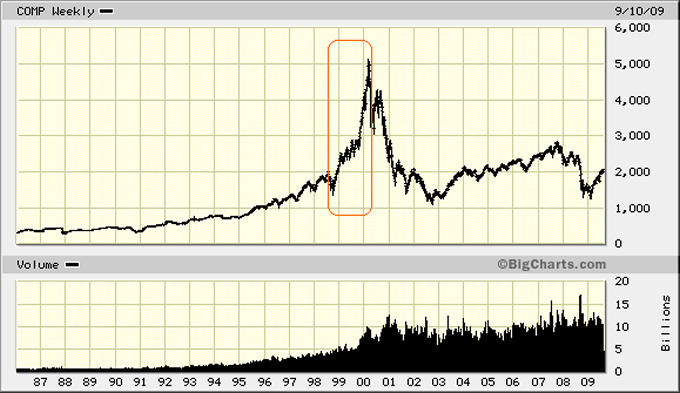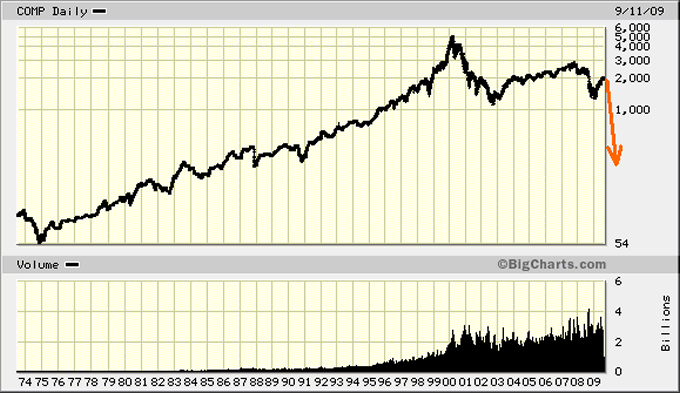The US Government's Journey to Economic and Stock Market Collapse, Are we there yet?
Stock-Markets / Financial Crash Sep 12, 2009 - 07:01 AM GMTBy: David_Calderwood
 Regular visitors to LRC are probably scratching their heads by now. How can the U.S. stock market continue to zoom higher each day while the best that can be said of the U.S. economy is that the pace of job losses has slowed? Why are debates over massive new government programs overshadowing the economic typhoon that is slamming tens of millions of families with legions of unemployed adults?
Regular visitors to LRC are probably scratching their heads by now. How can the U.S. stock market continue to zoom higher each day while the best that can be said of the U.S. economy is that the pace of job losses has slowed? Why are debates over massive new government programs overshadowing the economic typhoon that is slamming tens of millions of families with legions of unemployed adults?
This sure seems like a classic case of drilling holes in the hull of the Titanic.
It reminds me of late 1998 to early 2000 when week after week, month after month the NASDAQ composite stock index levitated higher and higher without any meaningful declines.

In less than a year and a half the index exploded upward over threefold.
Anyone who attempted to apply rationality to market speculation at that time could only conclude that short-selling was clearly indicated. Needless to say, doing so was tantamount to stepping in front of a speeding locomotive. Trees really did appear headed for growth to the sky.
While not necessarily helpful in timing things, the "news" went through four stages of analysis during that period.
- At first, the rally was celebrated.
- Next financial analysts criticized it, calling the rise in prices a "sucker’s rally." News stories proliferated of unsophisticated speculators who didn’t even know the name of the company whose stock they purchased, they knew only its stock symbol. Rational observers saw the market completely de-link from reality.
- When the vertical climb bulldozed higher, rationalizations arose to explain why old measures no longer applied, generating trendy euphemisms like "the New Economy."
- Lastly, a consensus formed around the sustainability and inevitability of the uptrend. Bearish commentators were ridiculed and bullish pundits leapfrogged each other in naming ever-higher price targets for the future.
Because there’s always a mix of the above steps, the trick is to identify in an unbiased manner the dominant theme. Today I identify a lot of numbers three and four in the news media, but there’s enough of numbers two and three to cloud the issue.
The 1998–2000 experience should disabuse us of the notion that reason, rationality, or corporate earnings reports govern future market trends. History should have this effect, but it doesn’t. People still think the news (which today is still bad, no matter how deftly is it spun) should drive the stock market.
If the news drove the market, then last March when the news was uniformly catastrophic it should have led to an all-out crash.
Of course, it didn’t. Peak levels of fear, driving the news cycle, coincided with a low in the markets.
How’s that for paradox?
John M. Keynes is quoted as saying, "The markets can remain irrational longer than you can remain solvent." A broader construction might be, "Collective illusions can remain in place far longer than most rational observers expect."
A collective illusion supports all manner of sub-illusions like fiat money, the trustworthiness of government debt, the efficacy of the regulatory state, the omnipotence of the Fed, etc. We can think of the collective illusion as an onion; sub-illusions that are no longer sustainable are peeled away one layer at a time.
One that recently ended is the belief that individuals can prosper by assuming increasing levels of debt.
One that survives is that collectives (like nation-states) can do so.
Inscrutable, isn’t it?
It seems that this latter illusion is in a "NASDAQ 1999" trajectory. We can’t know when the Federal Leviathan’s "March 10, 2000" moment will arrive, but we should always recall the 80% decline that crushed that stock index in the ensuing year and a half. That decline began when certainty of the rally’s continuation was near total. Today the NASDAQ composite index, when adjusted for inflation, is at 1997 levels, and if the analytical method I use has any merit, the red arrow describes where it’s headed sooner than later.

What if the putrid flood spewing from Mordor-on-the-Potomac followed the same trajectory? Peel away enough of those collective illusions and that’s just what will occur. This is what our political masters most fear, and is a process over which they exert no control.
Thoughtful readers might apply those "four stages of analysis" to discussions of the sustainability of U.S. government borrowing, spending, and existing and proposed programs. Like any passenger dragged on a long and unpleasant trip, the exasperated question on our lips might be, "are we there yet?"
September 12, 2009
David Calderwood [send him mail] a businessman, artist, and author of the novel Revolutionary Language, selected January 2000 Freedom Book of the Month at Free-market.net.
© 2009 Copyright David C. Calderwood / LewRockwell.com - All Rights Reserved
Disclaimer: The above is a matter of opinion provided for general information purposes only and is not intended as investment advice. Information and analysis above are derived from sources and utilising methods believed to be reliable, but we cannot accept responsibility for any losses you may incur as a result of this analysis. Individuals should consult with their personal financial advisors.
© 2005-2022 http://www.MarketOracle.co.uk - The Market Oracle is a FREE Daily Financial Markets Analysis & Forecasting online publication.



